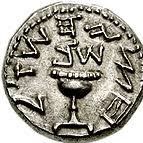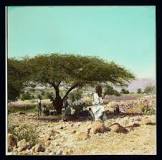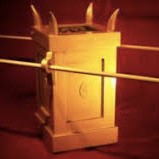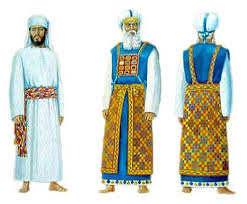Hanukkah-The Ultimate Torah Challenge Torah Living Daily Challenge Episode 32 No better time of the Torah Observant Believer in Y’shua Messiah’s calendar year better exemplifies challenge—that is the daily life of living Torah Y’shua-style that Hebrew Rooters face,...
The Significance of the Half-Shekel Ransom Offering to Messianics Today–Reflections on Torah Reading #68
The Significance of the Half-Shekel Ransom Offering to Messianics Today--Reflections on Torah Reading #68
The commandment given to the Hebrews by YHVH that they give a half-shekel ransom offering at the time of census holds tremendous prophetic and spiritual significance for today’s Messianic.
The Text: Shemot 30:11-38
11 ADONAI said to Moshe, 12 “When you take a census of the people of Isra’el and register them, each, upon registration, is to pay a ransom for his life to ADONAI, to avoid any breakout of plague among them during the time of the census. 13 Everyone subject to the census is to pay as an offering to ADONAI half a shekel [one-fifth of an ounce of silver]- by the standard of the sanctuary shekel (a shekel equals twenty gerahs). 14 Everyone over twenty years of age who is subject to the census is to give this offering to ADONAI- 15 the rich is not to give more or the poor less than the half-shekel when giving ADONAI’s offering to atone for your lives. 16 You are to take the atonement money from the people of Isra’el and use it for the service in the tent of meeting, so that it will be a reminder of the people of Isra’el before ADONAI to atone for your lives.” (Exo 30:11-16 CJB)
The Requirement
YHVH required a half-shekel ransom (deemed an offering by some translations and commentaries) be received from every Hebrew male at the time of numbering the children of Israel (vs. 12).
Now, the question that many of you may ask is: where does it say only Hebrew males were to pay this half-shekel ransom? Indeed, Stern’s Complete Jewish Bible rendering of this verse clearly suggests only males were expected to pay this ransom. However, the so-called authorized, English texts do not stipulate gender at all.
Nevertheless, one must take into consideration both context and history when arriving at a conclusion on gender as it applies to this mitzvah (ie., commandment).
And we’ll get into these elements of context and history a little later as it relates to who specifically (ie., gender-wise) was responsible for paying this ransom.
The Timing of the Half-Shekel Collection
Now, this ransom was to be collected at the time of “census” taking. Some English translations choose to use the word “numbering” or “sum.”
What Census?
Now, as expressed in our Torah Reading today, the use of the term census is not entirely clear. There are some important issues to clear up before we can move forward with our discussion.
To begin with, one must discern whether our modern-day, western concept of a census applies here nor not.
Clearly, when we in the West read or hear of a census, we think of a nation’s government making an official count or survey of its population.
What Kind of Census Was Moshe to Conduct? If Any at All?
But the question that must be answered here is: Is Moshe being tasked by YHVH to conduct an official count or survey of the children of Israel? Would this official count be the same as that which would be conducted in the Cepher/Book of Numbers? Or is this so-called “census” or “numbering” something else entirely?
According to J. H. Hertz, editor of “The Pentateuch and Haftorahs,” the numbering of the children of Israel had to do with the mustering of able body men for the nation’s army.
Interestingly (particularly when talking about which genders were responsible for paying this ransom), Hertz renders his English translation of verse 12 as follows:
“Then shall they give every man a ransom for his soul unto the LORD…”
A Military Application Implied
Now, according to Hertz, one must look at this idea of a ransom being collected from those who would be enlisted into the nation’s army from the standpoint of moneys paid by one who is guilty of taking human life in circumstances that do not constitute murder (ie., compensation for wrongful death).”
Hertz states:
“This technical expression for ‘ransom’ occurs three-times in Torah, and each time it refers to the money paid by one who is guilty of taking human life in circumstances that do not constitute murder (eg., in the case of a known dangerous ox killing someone). Such a ransom [however] was forbidden in the case of a deliberate murder. The soldier who is ready to march into battle is in the eyes of Heaven a potential taker of life, though not a deliberate murderer. Hence he requires ‘a ransom for his life.'”
The HCSB’s (ie., the Holman Christian Study Bible’s) commentary on this verse suggests (as does Hertz) that this 1/2-shekel ransom (or tax if you will) would be collected at the time of a “census” that is tied to military campaigns or preparations therein (eg., Num. 1:2, 20-45; Jug. 20:2, 15-17).
Who Was to Pay the Half-Shekel?
As it relates to YHVH’s instruction of this 1/2-shekel ransom being paid by every Israelite, Father required the ransom be collected from “every one that passes among them that are numbered” (vs. 13). Hertz interprets this to mean: the 1/2-shekel ransom was to be collected of every soul that passes “before the officers mustering the forces for battle.”
The 20-years of age spoken of in verse 14 speaks to the military age of the would be soldier in Israel’s army.
And then Father stipulates in this instruction that the rich shall not give more, and the poor shall not give less, than the half-shekel (vs. 15). Indeed, every soul is valued equally by YHVH.
The Battle With the Midianites–An Historical Example
But Hertz entertains another Jewish commentator’s perspective on this verse, citing the nation’s battle against Midian as recorded in Numbers 31. Victorious over the Midianites, the warriors rendered portions of their spoils and oblations unto YHVH for purposes of making atonement for their souls before YHVH (vs. 52).
So why would the soldiers do such a thing? Well, Hertz’ commentator goes on to explain that “the horror of shedding human blood,” regardless if it is justified, requires some form of recompense and atonement on the part of the victors. Again, another supportive for this ransom and census being related to some type of impending military campaign.
According to another commentary on the passage I came across, the NET Commentary:
“The sense rendered here in this passage is one of whenever a census of the nation were to be taken (ie., not just of the men of the nation per se). However, the commentary does make mention that the Hebrew terms used to describe this numbering of Israelites may have something to do with “mustering an army for a military purpose.”
Where’s Mention of an Impending Military Operation?
But the commentary rightly mentions the fact that there is no mention of any impending war. And if indeed Abba’s intention was for this mustering or numbering to be related to war preparations, then this instruction would be an establishing of the principle “that when they should do this, here is the price” (B. Jacob; Exodus, 835; reference Num. 31).
In such context, a would be soldier becomes a murderer in the event he were to kill an opposing combatant. And it would be for this reason his blood would be “forfeited.” Therefore, Torah required that he pay a ransom for his actions. And the reason offered is that “every human life possesses value and must be atoned for.” Thus, the 1/2-shekel payment represented a “presumptive ransom” such that the soldier paying the required ransom would not be faulted for what he did in the course of battle.
The Purposes of the Half-Shekel Ransom
Our reading seems to detail a few reasons or purposes for the collections of this ransom:
(1) The half-shekel ransom offering would serve as a means of atonement for the individual at the time of the census or numbering. And the ransom would somehow stave off the breakout of plague among the people (vs.12).
(2) And it would be used for the service of the Tent of Meeting (aka the Tabernacle). Essentially, the collected half-shekels would serve to maintain the physical elements of the Tabernacle (vs. 16). The Talmud mentions that the proceeds from this ransom collection or tax would be applied “to communal sacrifices and for the needs of the capital.”
The Plague Aspect of the Half-Sekel Ransom Offering
Now, as it relates to the mention of staving off a plague through the giving of this shekel offering, Hertz comments that the Hebrew term for plague is negeph,” the root of which comes from the same word used for “slaughter in battle.” The thinking is that this half-shekel offering would be rendered in order that “they suffer not defeat in battle.”
Our Haftorah Reading for this week details an incident in 2 Kings 12:1-16 where the ransom moneys had not been used for the upkeep of the Temple as mandated by YHVH. The righteous king at the time, Y’ho’ash, instructed the priests to make the needed repairs to the Temple using the ransom moneys Torah stipulated be set aside for this very purpose.
What is a Shekel Anyhow?

The Half-Shekel Ransom Offering foreshadowed the ransom Mashiyach for our souls and it taught us about giving unto YHVH.
So what’s a half-shekel anyway? Well, originally it was a unit of weight in the ancient near east. In fact, according to Wikipedia, the Hebrew term “shekel” is based upon a Semitic root word meaning “weight” or “weighing. It should be noted, however, that the term “shekel” was not unique to Israel as it has been found in some Akkadian Empire writings.
The shekel, as a unit of weight among the ancient Hebrews, was basic to trading before the development and use of coins in Ancient Israel many years later.
Another portion of this week’s Torah Reading details the mixture of the anointing oil using the Shekel as the measured amounts for each ingredient of the mixture (Exo. 30:24).
Uncertainties Abound As to What a Shekel Really Was
The crazy thing as it relates the required half-shekel mentioned by YHVH in our Torah Reading today is that no one (ie., no commentator) that I’ve have come across has defined that which each person counted was to put into the hands of the people collecting the ransoms. We know the half-shekel was a weight. But a weight of what. It would have to be something of some modest value. And at the time this mitzvah would have been written, the nation was not using any monetary currency such as coins. And we know that in time, the nation did adopt currency in the form of coinage.
The only thing I can discern after digging into this question is that each counted man would give a half-shekel of silver or gold. Something of value that could be used to maintain the Tabernacle. I mean, it wouldn’t make sense that the half-shekel item was some type of produce because the produce over time would rot. So I’m inclined to see this as as some form of precious metal that would have weighed half-a-shekel.
No one is truly certain of the actual weight and or worth of the half-shekel, especially in today’s system of measurement. But the closest I can get to any kind of consensus is that it equaled about 160-grains of barley and weighed about 8.5 to 9.6 grams. It would be worth between $5 to $6 today.
Another Perspective on the Census and Purpose for the Ransom
Now, Richard Elliott Friedman’s “Commentary on the Torah” takes an entirely different stance on the meaning of a ransom being collected at the time of a census. And let me just say at the outset here: Friedman is not operating in a vacuum here. I’ve come across a number of other commentators who agree with his position. But according to Friedman, a census was considered (culturally speaking) a bad thing. In other words, the undertaking of a census had superstitions attached to it. For censuses gave nation leaders control for purposes of conscripting her citizens; inciting forced labor; and taxation. And this is somewhat played out in 2 Samuel 24. In this recorded census undertaken by King David, a plague broke out in Israel as a result. Thus, the ransom collected, as described in this passage, would counter any resulting plagues.
As it relates to the 2 Samuel 24 passage, indeed, King David engaged his military leader Joab, to number the people. Obviously, this census or numbering was (1) not authorized by YHVH; (2) apparently did not entail the collecting of the required 1/2-shekel ransom; (3) and King David entered into this numbering of the people for what appears to be national security reasons such that he did not trust YHVH to secure the nation. In other words, David trusted in numbers and stats over trusting YHVH for the nation’s well-being.
According to ESV commentary on 2 Samuel 24:
“By numbering the people for military purposes, David apparently showed a lack of trust in the the Lord to supply the necessary men when needed, and wrongful pride in the hundreds of thousands of forces at his command. Joab knew it was wrong. Exodus 30:12 has a reference to the need for a ‘ransom’ after the counting.”
The Superstitions Tied to Census Taking
So, the point to be made as it relates to the thinking that the ransom collection at the time of censuses was to address the superstitious thinking that a plague could break out if a nation’s leader engages the nation in a census, in my opinion, has inherent problems. The military angle and understanding to this story Torah mitzvah appears to me to be the most accurate interpretation. And the superstitiousness surrounding censuses seems to not be based upon any real understanding of Truth other than what can happen to a nation when a nation’s leaders fail to trust Father to tend to their national security needs. And I would affirm that any resulting plague is more than not what Hertz implies: atoning for a soldier’s potential taking of a combatant’s life on the battlefield.
Was this Census Governmental Counting of the Population or a Counting of Military Aged Men for Service?
In verse 14, Father commands that everyone numbered in the census age 20-years and older would be required to render this ransom at the time of the taking of the census. Now, the census that would be taken, as commanded by YHVH, as recorded in Numbers 1, appears to be a different event, taken for a different purpose altogether than that which is discussed in our focus passage here.
The NET here seeks to steer the reader away from any consideration that this ransom had anything to do with numbering the people in anticipation for some military campaign. The commentators suggest that the numbering of the people was for purposes of “counting the losses and to cover the danger of coming into such proximity with the holy place” and that “payment was to be made to ransom the lives of the people numbered so that they would not die.”
Now, I don’t necessarily agree with the NET’s take on this census ransom. I tend to lean towards this being geared more to a mustering of military age men who for purposes of fulfilling the requirements of Torah would be compelled to render unto the sanctuary a ransom tax so that all would go well for every obedient soldier. And the simple fact that Father stipulates a specific age here highly suggests Father is referring to military census taking.
The Mandated Ransom Becomes a Tax
We find in Charles’ Old Testament Pseudepigrapha, the “Fourth Book of Maccabees,” a likely reference to this verse. The writer documented Seleucus IV’s (Philopator’s—218-185 BCE) sanctioning this half-shekel ransom as a yearly tax levied upon all Jews. This act, according to signified that Seleucus recognized the Jewish government and the authority of the high-priest office as being the chief ruler of the nation.
Half-Shekel Becomes a Jewish Tax
Now this ransom ultimately was changed to be that of an annual tax by the so-called Jewish sages. In that, the half-shekel annual tax was collected for the expressed purposes of “maintaining the public services of the Temple.” It became a contribution required of every Hebrew. And literature documenting the times in which this tax was collected, strongly suggests that Jews throughout the region were “zealous in their contribution of this Temple tax.”
Roman Influences Relating to the Half-Shekel Tax
So zealous were the Jews in fulfilling this obligation that they received criticism from at least one Roman provincial Governor, citing that the Jews were sending too much money out of the country, over to Jerusalem. Thus, this Roman Governor seized the funds for Roman government purposes.
Eventually, the Romans completely abolished the tax. Despite the formal abolition of this tax be leveled upon the Jews throughout the Roman Empire, Jews in the Diaspora used the funds they would normally send for the annual Temple tax to support local Rabbinical Academies throughout Palestine.
A Poll Tax?
The concept of the census or numbering (ie., the beka) of Israel is viewed as a poll tax to be levied at each male Israelite that passed over. This poll tax would be collected from each male 20-years old and up. In Exodus 38:26 that number (ie., presumed the first census) was recorded be 603,550 men.
According to the Babylonian Talmud, under “Tract Shekalim,” this 1/2-shekel ransom is referred to as a “head-tax.” In Jewish circles, this head-tax is referred to simply as a “shekel.” This section of the Talmud contends that the shekel was required of every male upon the completion of his twentieth-year.”
Now, bear in mind that there is no mention here of any census or numbering prompting the collection of this tax or ransom. Only that this tax was to be collected by the powers that be on the individual’s 20th birthday.
Modern Day Rabbinic Teaching
I draw my references to modern day rabbinic teachings on this passage from www.chabad.org.
Ramban (aka Maimonides) numbered this mitvah #171. It is referred to as Sefer HaMitzvot–Giving of Half-Shekel.
According to Rabbinic teaching, 1/2-shekel must be given at the end of every sacred calendar year (aka Adar). Women are not obligated to give this offering. Why? Because when this offering was mandated by YHVH, it had to do with the offering being given by military aged men. Women were not considered part of the army in Torah days.
The age for service in the army, according to the sages, was 20-60 years. Service was required of all males who fell within this age range.
There is some disagreement among Rabbinic scholars as to the age males are obligated to begin giving the yearly 1/2-shekel. Most scholars hold to the Torah age of 20-years. But some contend males that enter bar-mitzvah age (ie., 13-years) are required to begin giving the 1/2-shekel offering each year.
How is this Mitzvah Practiced Today by Observing Jews?
A special Torah Portion (Reading) memorializes this mitzvah. The reading of this passage on the last Sabbath of the 12th-month (Adar) fulfills this mitzvah according to the rabbis. Interestingly, it has become customary to give 3-half-shekel offerings each year in the month of Adar: (1) Erev Purim; (2) Esther Purim; and (3) Purim.
The Biblical Concept of Ransom
The term “ransom” plays a prominent concept in our Torah Reading passage today. In Hebrew, the term for “ransom” is “kofer.” This Hebrew term is related to the concept of “atonement” or “to atone.” Here, this noun, “kofer,” refers to that which would in advance be paid for the life that is taken. This is a vicarious offering: the life of the soldier or offender in exchange for the money. Vicarious in the sense that one is delivered or redeemed by substitution. Therefore, the individual’s soul is made safe that pays this 1/2-shekel offering. And this 1/2-shekel offering is collected at the time of the numbering or census (vs. 12).
Essentially, kofer denotes the price one pays for a life.
Egypt was given as ransom (ie., kopher) for Israel’s restoration (Isa. 43:3).
To atone by offering a substitute.
The verb kopher is used in connection with sin or defilement with very few exceptions such as in Genesis 32:20; Proverbs 16:14; and Isaiah 28:18.
The Concept of Reconciliation Tied to the Halk-Shekel
It illustrates the concept of reconciliation from more of a Tanakh perspective.
Similarly seen in the meaning behind blood sacrifices.
The concept of ransom (some translations such as the HCSB used the English term “atonement”) is a truly substantive one under the auspices of the Renewed Covenant:
Matthew 20:28–“Even as the Son of man came not to be ministered unto, but to minister, and to give His life a ransom for many” (KJV; cf. Mat. 10:45).
Of course the concept of ransom is figurative of Yeshua; of Saviour; and of Redemption.
1 Timothy 2:6–“Who gave Himself a ransom for all, to be testified in due time” (KJV).
1 Peter 1:18, 19–“Forasmuch as ye know that ye were not redeemed with corruptible things, as silver and gold, from your vain conversation received by tradition from your fathers; but with the precious blood of Christ, as of a lamb without blemish and without spot…” (KJV).
Should Netzarim Give 1/2-Shekel Offerings?
In my opinion, since we no longer have a Tabernacle or Temple in which the 1/2-shekel offering would go towards its maintenance; and the fact that we are no being numbered into a national army in anticipation of some war campaign; and the fact that we are not under Rabbinic oversight stipulates that we cannot fulfill (halakhah) this commandment.
However, the Spirit behind this mitzvah is clear. In fact, it is underscored in this week’s Brit HaDashah reading of 2 Corinthians 9: 6-11. The passage reads as follows:
“What I mean is this: the one who sows a small number of seeds will also reap a small crop, and the one who sows a generous amount of seeds will also reap a generous crop. Everyone should give whatever they have decided in their heart. They shouldn’t give with hesitation or because of pressure. God loves a cheerful giver. God has the power to provide you with more than enough of every kind of grace. That way, you will have everything you need always and in everything to provide more than enough for every kind of good work. As it is written, ‘He scattered everywhere; he gave to the needy; his righteousness remains forever (ref. Psa. 112:9). The one who supplies seed for planting and bread for eating will supply and multiply your seed and will increase your crop, which is righteousness (ie., tzedakah). You will be made rich in every way so that you can be generous in every way. Such generosity produces thanksgiving to God through us” (CEB).
The Spiritual Application of the Half-Shekel Ransom Offering
The Spirit of the Exodus 30:11-16 passage underscores the reality that Torah served as our schoolmaster until our Master Yahoshua Mashiyach came on the scene (Gal. 3:24, 25). Whereas, originally speaking, Father required us to give a half-shekel (males) in the event we were mustered for an anticipated military campaign. And the fact that this required offering of the half-shekel would serve as a ransom for us going into battle (aka atonement) and stave off any potential plague that may overtake us as a result of our taking combatants’ lives in the course of battle; and also the funds would be used for the upkeep of the Sanctuary to me clearly shows Father was teaching us to (1) trust Him in all things, including war; (2) to give; and (3) to test our obedience to His commandments.
The Half-Shekel Teaches Us About Giving
The half-shekel offering mitzvah is another element of Torah given to the Hebrews that teaches 3-essential elements of giving unto YHVH, all of which are extremely relevant to Messianics/Netzari today:
1. Giving supports the work of the Gospel.
2. Giving instills Faith and Trust in the Almighty.
3. Giving is a critical form of worship.
Hanukkah–The Ultimate Torah Challenge–Torah Living Daily Challenge-Episode 32
What About Grace Then? Part 10 of Grace and the Law Series–Sabbath Thoughts and Reflections 39
What About Grace Then? Part 10 of the Grace and the Law Series Sabbath Thoughts and Reflections 39 Calendar 22nd day of the 9th Biblical Month—Kislev Just 2-days before the start of Hanukkah—sundown December 7th, ending on Sunday the 14th According to the Calculated...
Torah and Politics–Torah Living Daily Challenge 31
When you have come unto the land which Yahovah your God gives you, and shall possess it, and shall dwell therein; and shall say: I will set a king over me, like all the nations that are round about me; you shall in any wise set him king over you, whom Yahovah your God...
Grace or the Law, Which is it? Part 9 of the Grace and the Law Series–Sabbath Thoughts and Reflections 38
Grace and the Law, Which is it? Part 9 of the Grace and the Law Series--Sabbath Thoughts and Reflections 38 As I am putting the finishing touches on this Sabbath Thoughts and Reflections, Thanksgiving is at the door. Despite what is typically a joyous time of year,...
Israel Yesterday, Today and Tomorrow–Torah Living Daily Challenge 29
Israel Yesterday, Today and Tomorrow Torah Living Daily Challenge 29 As I came to the end of Parashah 47, I went over to the Haftorah reading that is found in Isaiah 54:11-55:5. What a heart-lifting passage of Scripture. And let me just say before I move forward with...
We are no longer under the Law? Grace and the Law Part 8–Sabbath Thoughts and Reflections 37
We are no longer under the Law? Grace and the Law Part 8 Sabbath Thoughts and Reflections 37 Calendar 2nd-day of the 9th-Biblical Month--also known as Kislev. The renewed moon was sighted over the land of Israel by members of the New Moon Society—headed by Torah...
Where is God’s Dwelling Place-Part 2-Torah Living Daily Challenge 28
Where is God's Dwelling Place Part 2 Torah Living Daily Challenge 28 In my last Torah Living Daily Challenge, we discussed the last Torah Portion section of Parashah 47 that addressed the Feasts of the Lord and our celebrating before Yahovah at the place of Father’s...
The Feasts of the Lord and our Priorities–Where is God’s Dwelling Place Part 1–Torah Living Daily Challenge 27
[podcast src="https://html5-player.libsyn.com/embed/episode/id/3942165/height/360/width/480/theme/standard/direction/no/autoplay/no/autonext/no/thumbnail/yes/preload/no/no_addthis/no/" height="360" width="480"]The Feasts of the Lord and our Priorities Where is God's...
Opinions Matter Only So Much–Torah Living Daily Challenge 26
Opinions Matter Only So Much Torah Living Daily Challenge 26 The other day, I found myself in an awkward situation, which I surmise is not uncommon to many of us in the Hebraic Roots. And I would venture to say that, with the advent and popularity of social media,...
Living Under the Curse of Torah–Grace and the Law Part 7–STAR 36
Living Under the Curse of Torah Grace and the Law Part 7--STAR 36 Calendar 25th/26th day of the 8th Biblical Month--also known as Marheshwan Approaching the beginning of the 9th Biblical Month—if all goes as expected, this coming Friday at sundown, the 13th of...





